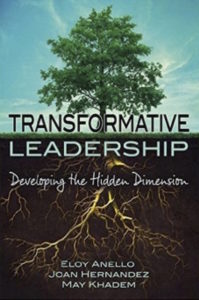At Nations University in Guyana, we offer a Master’s in Education, in which the students receive a diploma in Educational Leadership from the University of Cambridge. The course materials affirm that “leadership is very widely studied, but not well understood.”

The students in our Master’s program have found the book on Transformative Leadership by Eloy Anello, Joan Hernandez, and May Khadem to be like a breath of fresh air amidst the academic theories they are obliged to study. As one student, Indra Ragnuth commented: “In this Master’s in Education program, we encounter so many theories, but the one that resonates most strongly with us is Transformative Leadership.”
Our Master’s in Education course begins with an examination of what is wrong with education internationally. We learn that “the organizational structure of most schools is fundamentally unchanged since the beginning of the century …for the most part they are hierarchical, bureaucratic and balkanized.”
Internationally, the present attempts at educational reform are proving largely ineffective. Teaching is at a crossroads (Fink 2005: xv, 13). Constant cutbacks, increasing class size, publicized tables of school performance, outside inspections which are of a punitive nature, all contribute to teachers losing the pleasure of teaching.
We are consumed with testing in schools in a mythical search for ‘growth’ that could instead be used for nurturing maturity and deep learning. Hargreaves & Fullan(2012) reflect that there is an obsession with ‘data’ which, in turn, prevents teachers from reflecting on what they are doing, which leads to overlooking important topics for today’s world, such as Environmental Education, World Citizenship, and Health Education.
We know that in recent years, society has become so much more complex; therefore, education needs a more sophisticated model of leadership. We need leaders of leaders, teachers who foster leadership in students.
The critique is as relevant to the North as to its poorer neighbors in the South. Kozol states, “we limit what we teach to what we can easily measure…. thereby pushing our children to focus on memorizing information and regurgitating facts …Imagination and empowering are not big items in the testing and accountability agenda…Choosing the right answer to someone else’s question is what counts.”
How can we, therefore, achieve change?
We need a new agenda, new lines of action and a movement away from robotic teaching in a bid to transform the entire profession. Teachers need to reflect on new ideas. They need to plan for the future and reflect on the past. We need to encourage teachers to take risks and protect others who take risks. We can’t make progress without taking risks. We need to change teaching into a collaborative and collegial profession. We need to regard schools as having a soul. We need to care for those around us and focus on how persons interact with one another. Teachers need to appreciate that they are part of something bigger than themselves.

Grace Mohamed, one of the students of education at Nations argues that “Transformative Leadership offers hope in developing this new paradigm. We have to change the way people think.”
Transformative Leadership regards leadership as an opportunity for service to others rather than for self-aggrandizement. Another of the students, Duane Phillips, commented that “such an approach does not create dependency. Rather it seeks to empower those who are served.”
Another student, Felicia Dupan, shared: “One of the most valuable features of the Transformative materials was the focus on self-evaluation and learning from reflection. I found this of great benefit in helping me to recognize my strengths and weaknesses. I began to understand that the process of self-reflection was not to dwell on my shortcomings but to learn and grow.”
Another student, Alexandra Collins, said that in reflecting on the materials from Anello and Hernandez she began to understand how crucial the art of encouragement is. She stated, “we need to see the significance of enjoying the success of others, something that is all too often in short supply in our culture in Guyana.”
Our discussion in the Master’s in Education class last weekend focused on how these theories and ideas can be applied to the Guyanese context. We reflected on dealing with constructive criticism, learning from experience, developing effective listening skills and providing constructive feedback to those with whom we work.

Dr. Brian O’Toole is an Educational Psychologist from the UK who moved to Guyana 42 years ago to be of service to the Baha’i community in Guyana. He has served as a consultant for a range of UN agencies in 36 countries on education, health, and development projects. Brian has written more than 60 articles in international journals. He was recently given the highest National Award by the Guyanese government and in May was presented with the MBE by Prince William at Buckingham Palace for services to education.
